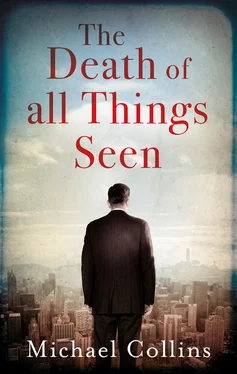He might have put Lee-Ann’s claw foot tub on his board right alongside Joanne’s heirloom table, run the calculation of perceived value against its eventual purchase price. He was sure it would come out to pv < pp , or more likely pv ☹ pp .
It was there again, his underlying cynicism, and yet the world got along, and people like Lee-Ann kept on living and dreaming of comforts and contingencies that weren’t worth a damn, in the empirical sense that there would be no sale of said item, and yet a delusion could be upheld, or put another way, a belief could be maintained, or a hope. That was more probably it.
The great miracle was the reach of the Saturn with its yellow warning lights that never went out and somehow didn’t amount to anything of real consequence, so it was not the car at all, but the electronics, the warning lights that had to be simply ignored.
Thomas Strait read the signs that mattered. He said that on the way up. He and Norman were aligned along a revelation of converging truth. Perception was one thing and reality another. They talked about the Saturn like it was a great metaphor. Thomas Strait was on that level. He could talk and not talk about something. It was a gift seeing it in its nascent form in a man like Thomas Strait. He felt in his heart, that here was a friend found when the heart had begun to close off and that it mattered again that he proceed onward through life.
The kids, too, were in the car, alongside Lee-Ann, because people like this would have it no other way. School or the structure of life could be abandoned, if need be, if opportunity presented itself, and these were the Joads, or a variant of them. They would always survive.
Norman was glad they had come. He felt the weight of a gathering influence of how a connection to others was essential to a greater understanding of life. As for Kenneth, he didn’t push it. What they had shared between them was passed. This was the general nature of modern relationships, or so he believed, a person, or a series of people, footholds on the edge of a moment that might be eventually navigated. He thought of the apparatus of belay ropes, the piton spikes, the contingency of a bivouac, the sheer face of life’s quest that required the nuanced read of flaws and weaknesses essential to the ascent but, equally, to the descent.
He had sold the idea of a once-in-a-life time road trip, offering it on the spur of the moment, because he had wanted out of Mill Shoals.
Regrettably, though, Norman could not accommodate a meeting with Mr Whiskers, not right then, or the next day, for that matter. Mr Whiskers was tied up with meetings.
Thomas smoothed it all over. There was enough to occupy them with the swimming pool and the buffet breakfast and the pay-per-view movies and room service. Then there were the museums along the Lake Shore that they could visit.
The room, and whatever they ordered, it was all on Norman’s credit card.
Down in the Loop, Norman went to an ATM to withdraw money for incidentals. Thomas’s expression was one of abiding thanks as he accepted the money.
There was a deep-dish pizza they should try and a Chicago-style hot dog. There was so much Norman might have advised them to see — a pair of beluga whales at the aquarium, circling ghosts of strange discontent, alive and without hope, these creatures that once ranged oceans.
Norman’s head was partway in the open car door before he left. Lee-Ann was holding Sherwood. He was in her lap still, smiling, like this meant everything in the world to him, which it did at that moment, and Norman thought this was perhaps the rush of what Mr Feldman had felt on the occasion of his kindness, and that Mr Feldman had done what he could, in the damaged way his life had turned out, in the loss of his son to war, and probably so much more that Norman would never quite know or ever understand.
Lee-Ann reached and shook Norman’s hand. She leaned so her cleavage showed. It was purposeful and intended. She smiled in so doing it. She had a sex men yearned for, and she could torment a heart for a number of years yet. It was her true essence, no matter the prevailing politics or attitudes of political correctness. She had on the same dress and flip-flops, and this city would see something so rarely seen anymore, a woman of no prospects and rising spirits intent on enjoying life.
DOWN ON THE street below his hotel window, Nate could hear the sound of traffic. There were people everywhere. He had lost a certain perspective, an ability to see in the way one loses a sense of depth perception on the tundra. The Eskimo compensated and learned to see the world through a slit in a piece of bone. He was doing it through the split of blinds. His eyes hurt and adjusted. It was snowing.
The projector was a heavy gunmetal grey contraption with a dead weight not found anymore in objects. It had once been the property of the Elgin Public School System. It said so on a metal tag, a projector undoubtedly used to address and educate a conflagration of life’s great conflicts in the fifties — Sex Education and the Cold War.
Nate set the projector on a chair. A length of cord ran to a wall socket, the projector pointed to the interior of a closet wall into a maw of darkness. A light glowed, a smell of scorched dust illuminated in a scattered beam. A label cautioned the bulb had to warm and cool in the vacuum tube apparatus, its filament visible to the eye.
Nate followed the instructions. He had the box of reels on the bed, the dates labeled. They were in chronological order. He had dates in his head, certain years. He moved them accordingly with some calculus of events running through in his head.
It was the saddest he had been in a long time. He was aware of it. He had hoped for a sequence of mishaps, a border crossing where he was denied entry into America and turned back. That would have ended it.
He would be lying if he said he didn’t know why he had come south again. In Grandshire, on the Internet, he had seen pictures of Norman Price, the jawline of the Feldman family. He went searching for it not long after the letter from the lawyers.
He knew a dark secret was being revealed, one long suspected. It was still a great shock, even across the span of years, this disconnectedness to a half-brother, a relationship that could never be repaired, and yet the letter from Helen Price had arrived in the immediacy of a need, his own illness, in how this might actually work out.
He felt a shame in having conceived the idea. His kidneys were failing. He had been poisoned as Ursula had been poisoned. How best might it be explained? Did he dare ask for a kidney?
He was thinking, how Frank Grey Eyes might have asked. Perhaps in the apparent poetry of some grander, cosmic story, referencing a shared life source of a great headwater, the attendant tributaries of two life streams run to remote and distant regions, two waters diverged in the babble of different journeys, then rejoined in the brackish estuary of a great watershed, some opening to the sea, where all was one again.
This was how Frank Grey Eyes might have put it, but much better in his grand and overarching theory of everything. It was hard to speak with the conviction of Frank Grey Eyes, because that was Frank Grey Eyes’ undoubted gift and truth.
It sounded wrong appropriating what was not his understanding of life, when he didn’t believe in everything Frank Grey Eyes believed in.
Nate checked the public records of births and deaths. It was all there on the Internet, the year and the date of Norman’s birth. Perhaps Norman already knew this secret, but Nate doubted it. This was Helen Price asserting her hold over the Feldmans.
It was how he saw it, a cold indictment passed down. It was cruel, sending him these reels. She was asserting her influence in death. It suggested the sort of woman she was, or had been, calculating, reaching out in death to stab at him.
Читать дальше












